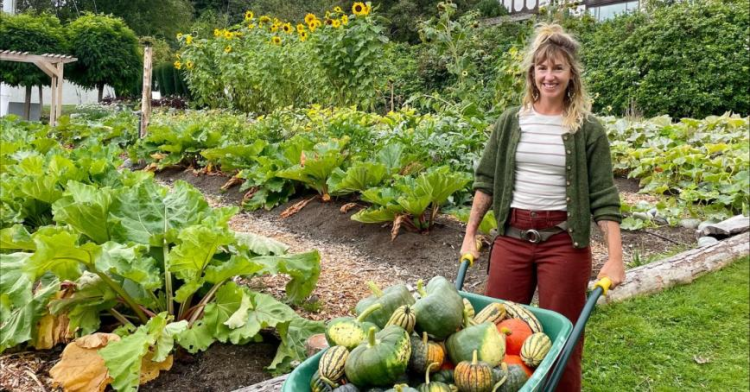Horsetail is the nemesis of many gardeners. It's also a common weed at the Royal Roads University Farm. But instead of seeing it as a source of frustration, Solara Goldwynn decided to learn more about this widely despised plant.

"I still pull it up, but now I also use it to make medicine and soak it to make compost tea, because it has all of these incredible benefits for our bodies and also for the land," says Goldwynn, the farm and food systems lead at RRU.
Four years ago, she was busy with her family business Hatchet and Seed, transforming yards into food-growing spaces. She happened upon a YouTube video of RRU President Philip Steenkamp, talking about his desire to grow food on campus.
For Goldwynn, the message resonated, and she sent a pitch, right to the top. And as she got more involved in planning the farm, she started a Master of Arts in Environmental Education and Communication at RRU in tandem.
The new Giving Garden a reimagined former 5.26 acre walled garden designed to support food security in the community was an obvious place to build momentum and win support from stakeholders, funders and volunteers.
In less than a day, Goldwynn and team transformed a patch of lawn into a food garden, smothering the existing monoculture grass with cardboard and layering rich soil directly on top. Within a month, she harvested her first crop. By the first season's end, the plot yielded more than 1,000 pounds of produce, all gifted to communities in need.
That was in 2022. Since then, the farm has expanded manyfold, to include an Indigenous Medicine Garden and soon, a large market garden that will sell fresh produce directly to the surrounding communities.
Beyond its bounty, the farm is also a space for community, and connection, says Goldwynn.
"I've had instances where adults have come to work on the farm, and they've never put their hands in the soil before. These spaces are transformative places, for people to connect to the land and tap into themselves." - Solara Goldwynn
It's been a whirlwind three years for Goldwynn, who relies on volunteers from Royal Roads and the community to help her with the work of the farm.
For her master's major research project, she says she rooted deeply in place to better understand the land, the plants and her relationship with them. She sat on the farm and observed. She journaled and paid attention to several of the species growing there, researching not only their biological traits but also their histories, medicinal uses, folklore associations, and cultural significance. Included among them, the lowly horsetail.
Through these explorations, Goldwynn says she began to shift her perspective.
"How can we see horsetail as something other than a pernicious weed?" she pondered. "What are the plants trying to teach us about the environment and also about ourselves? What does listening to the stories of plants, fungi, and seeds teach us about sustainability and reciprocity?"
These are the types of questions she poses to RRU students, who come to learn at the farm.
Food gardens are useful for teaching broader concepts of sustainability and environmental education, she explains. "They are actually these incredibly rich libraries of human culture and ecosystems."
Goldwynn crossed the stage at 2024 Fall Convocation. As for future plans, she hopes that grants and community fundraising will allow her to continue her work on the farm.
Learn more about the different ways you can support Goldwynn and her work.
Learn more about the Master of Arts in Environmental Education and Communication program.











